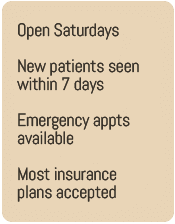10 Common Questions About Cancer
Because cancer can be a sensitive subject, some might have questions about cancer they are too afraid to ask. You may have a cancer concern, are newly diagnosed, are undergoing treatment, or know someone affected by cancer. Personalized Hematology-Oncology is here to help.
Cancer is one of the most common health diagnoses in the United States. An estimated 40.5 percent of people in the U.S. will receive a cancer diagnosis at some point in their lifetime. While this statistic can be daunting, the risk of dying from cancer has decreased dramatically over the past several years.
Check out these cancer FAQs (frequently asked questions) to learn more:
1. What is cancer?
Cancer is an illness caused by abnormal cells in the body growing out of control. As these cells ignore signals to stop growing, they become cancerous and can spread in the body. When cancer cells multiply and spread, they can infect tissue, bone and blood cells.
Cancer is a broad term and is technically not a disease by itself. Instead, there are over 100 different cancer diseases that fit into three classifications: solid, blood and mixed cancer.
2. What are the most common types of cancer?
Of the many cancer types, there are five types that are the most frequently diagnosed. According to the Cleveland Clinic, those five types of cancer are:
- Breast Cancer: Cancer that affects the breasts and is typically invasive. Breast cancer is more commonly diagnosed in women than men.
- Lung Cancer: A cancer that begins in a person’s lungs, often caused by smoking or exposure to second-hand smoke.
- Prostate Cancer: This type of cancer exclusively affects men and people assigned male at birth, as it begins in the prostate gland.
- Colorectal Cancer: Cancer that starts in the colon, also known as the large intestine.
- Blood Cancers: These types of cancers include leukemia, lymphoma and myeloma.
3. What are common cancer symptoms?
Like any illness or health condition, cancer symptoms are not one-size-fits-all. Instead, symptoms can vary depending on the person affected and the type of cancer. Oftentimes, in the early stages, no noticeable symptoms are present.
However, symptoms like consistent pain in one area, fever, weight loss, decreased appetite and night sweats have been connected to cancer cases. Symptoms can also reflect the area of the body affected by cancer, like respiratory symptoms or changes in the skin.
4. What causes cancer?
Because there are many cancer types, researchers have not pinpointed one specific cause of cancer. However, there are multiple suspected causes ranging from environmental factors to genetics.
Cancer causes include:
- Smoking
- Drinking alcohol
- Sun exposure
- Sedentary lifestyle
- Genetic mutations
5. What are the risk factors for cancer?
Risk factors can increase the chance of cancer developing. Along with the suspected environmental and genetic causes, additional risk factors can include:
- Family history and genetics
- Radiation exposure
- Immune system inflammation
- Age and gender
6. How can cancer be genetic?
Technically, cancer is not a genetic disease because a person cannot pass it down to their children. However, genetic variants can be passed down to children, and certain genetic variants are risk factors for developing cancer.
Because a person’s genes play a role in how cells in the body grow and multiply, genetic variants are tied to certain types of cancer. If a person and their family members have certain genetic variants, that is not a guarantee that cancer will develop.
Learn more about how genetics and cancer.
7. How is cancer diagnosed?
Depending on the type of suspected cancer, there are multiple ways to test for and diagnose it. Tests include blood work, CT scans, MRIs, biopsies and procedures like a colonoscopy. If cancer is found, it is diagnosed based on its size, location and if it has started to spread to other areas of the body.
The stages of cancer are:
- Stage 0: Pre-cancerous cells are present but have not begun to spread.
- Stage I: A small tumor is present in one area of the body.
- Stage II: A small tumor is growing in size and possibly spreading to the lymph nodes.
- Stage III: A tumor is embedded in surrounding tissue and possibly spreading to the lymph nodes.
- Stage IV: The tumor has metastasized and is spreading to other areas of the body like organs or bones.
Learn more about the stages of cancer.
8. How is cancer treated?
Cancer treatment depends on the type of cancer and the cancer stage. While cancer has no cure, the goal of treatment is to reduce symptoms, improve quality of life, and achieve remission, meaning there is no sign of cancer present.
The most common types of cancer treatment include:
- Surgery to remove the tumor
- Chemotherapy
- Radiation therapy
To help improve the lives of those diagnosed with cancer, new research is always underway to develop new cancer treatments.
9. What are the side effects of cancer treatment?
Side effects of cancer treatment vary depending on the treatment type and the individual patient.
Chemotherapy side effects can include hair loss, fatigue, a weakened immune system and a loss of appetite. Someone who has surgery might experience pain at the incision site, while someone who undergoes radiation therapy could have skin irritation, nausea or trauma to organs in the radiation site.
Personalized Hematology-Oncology strives to make our patients as comfortable as possible when undergoing treatment.
10. Can cancer be prevented?
Because cancer is complex, there is no perfect way to guarantee you will never be diagnosed. However, there are some lifestyle changes one can make to reduce the risk of developing cancer. These include:
- Avoiding tobacco and nicotine
- Reducing alcohol use
- Exercising regularly
- Eating a healthy diet
- Limiting sun exposure
While these lifestyle changes can help reduce the risk of developing cancer from environmental factors, cancer from genetic variations cannot be prevented in this way.
Learn more about cancer prevention.
Get answers to your questions about cancer
Cancer can bring up a lot of questions, and Personalized Hematology-Oncology is here to provide the answers you need. Whether you are recently diagnosed or looking for a change in treatment plan, the team at Personalized Hematology-Oncology can provide the support you need.
Contact us today to learn more about our comprehensive cancer treatment options.





